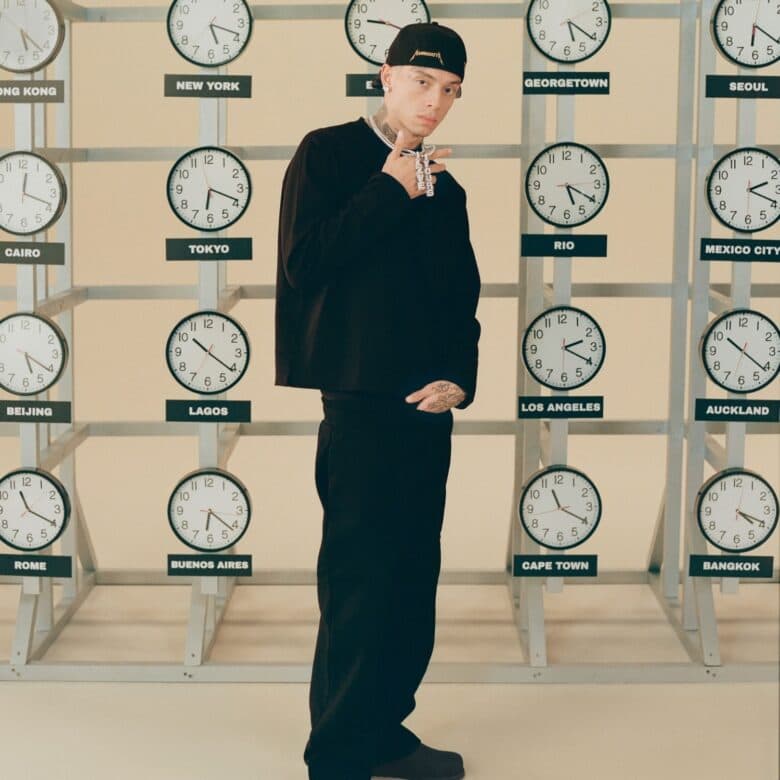Five Minutes with Nina Nesbitt: The Scottish singer embracing unfiltered emotion

It was over a decade ago when singer, songwriter, producer, and multi-instrumentalist Nina Nesbitt first burst onto the scene, when she was just a teenager. At the time, the star was ushering in a new age of pop — one that utilised the social media boom of the early 2010s, building up a cult-like fan base on X (formerly Twitter). It wasn’t really a surprise that Nesbitt found so much success during that period, as her music came with an intense sense of emotional honesty, making her an incredibly relatable figure for her audience at the time.
Still, as with any artist navigating their way through the industry at such a young age, there were issues, and it isn’t until now that Nesbitt finally seems to have found her place in the world, both musically and personally. Her upcoming album, Mountain Music, releasing later this year on September 27th, is Nesbitt at her most vulnerable yet. The project acts as an unfiltered peek into Nesbitt’s personal diary, as she touches on themes of isolation, insecurities, and the trials and tribulations that come with being a woman in the modern day. Outside of its profound lyrical content, it also acts as another huge milestone for Nesbitt’s career, as it will be the first release on Apple Tree Records — the artist’s own boutique label, named after one of her earlier EPs.
Today, fans were given the latest taste of Nesbitt’s upcoming album, thanks to the deeply soul-touching ‘I’m Coming Home’, in which the singer takes on a nostalgic journey back to the places and people she loves.
Here, HUNGER sits down with Nesbitt to discuss her latest single, what to expect from Mountain Music, and more…

‘I’m Coming Home’ is out now. How does it feel going home after you’ve been away for work for so long? What do you look forward to most?
I’m so excited! I’m currently writing this on the train back up to Scotland. It’s been years since I’ve been back to where I’m from; a lot of people have moved away and it’s not quite the same as it was, but I’m excited to see it and take a trip down memory lane. I’m going to visit Harlaw Reservoir, which was one of my favourite places growing up. It always feels like a sigh of relief seeing familiar places and hearing the Scottish accent everywhere you go.
Your album is partly inspired by your experience of growing up in a Scottish village. Which particular memories came to mind during the writing process?
As I was approaching the end of my 20s while writing this album, it naturally made me do a lot of reflecting and reminiscing. I feel like the longer you’ve been away from where you’re from, the more distant it can feel, and it’s something I’ve struggled with. I moved to London from the Scottish village I lived in when I was 17 to chase my dreams of being a musician. When I was younger, all I wanted was to break free from that small-town life and dive headfirst into seeing the world, gaining new experiences. The older I get, the more I think about how lucky I was to grow up there and see it in quite a different light now. I often think about the beauty of where I’m from: the Pentland Hills, the lochs, the city of Edinburgh a bus ride away, the way people are so friendly even to strangers. These big cities might have their famous landmarks, but I feel like the small towns and villages have invisible ones. For me, it’s the field where I had my first drink, the traffic lights where I’d meet my best friends on the walk to school, the house I was in when I found out my life had changed, and I’d been offered a record deal.
You recently moved from London to the countryside with your partner. How are you finding the quiet(ish) life?
To be honest, I just wanted to give my dogs the garden they deserve. It’s completely for them. Jokes aside, I was the least expected person to move out of London, but I have to say—I’m loving it! You get used to all the noise and chaos after living in London for a while, but I didn’t realise how distracting it was until I was back in the quiet. I’m definitely the most creative I’ve been in a long time. After touring America a few years ago and staying at random AirBnBs in the middle of nowhere en route, I realised I loved that feeling of isolation. I’d happily live on one of those islands in the middle of nowhere that you can only enter via boat!
Going back to the album – you mention time spent on tour in the US. What are the best and hardest parts of being on tour for you?
The shows are definitely the best part of touring. I love forcing myself to go out and see the place, even if I’m exhausted. You just end up leaving with so many more memories at the end of it. It’s always the weird and unexpected things you come across that stick with you, I think. The food is also a big yes from me. I’m a big fan of trying the local delicacy (within reason—no insects, please!) and love trying to recreate it when I’m home. The hardest parts for me are the lack of routine, lack of sleep, and dodgy motels. I have problems sleeping in new places, and it’s normally a new bed every night, so that can be tricky. I’m unfortunately one of those people who is awful on less than 8 hours sleep, so I often have a breakdown by the end. But it’s worth it when the shows are great!
The theme of wanting to run away is also a trope of the album. Does that have anything to do with your decision to ‘quit’ being an artist last year? What brought you to that decision, and what caused you to rethink it?
I spent a lot of time driving myself to and from Devon to record this album, and I loved the feeling of being on a road trip, rolling the windows down, and listening to the folk albums I grew up loving. I only recently started driving, and I absolutely love the sense of freedom it’s given me. There’s a mountain map that accompanies the album that people can follow while listening, as I really wanted people to feel a sense of escape while listening. Yes, I definitely wanted to escape being an artist for a while. I had quite a lot of things going on personally; I felt like having to dig deep to write honest songs was making what I was going through even harder, and the thought of putting myself out there publicly when I was in an emotionally vulnerable place felt too much. I didn’t want to face public criticism when I was just trying to get through each day. I think as artists, you can really feel the pressure to keep putting things out and riding on the momentum you’ve created, but it’s also okay to take a step back sometimes and protect your wellbeing.
‘Mansion’ speaks to society’s beauty standards for women. You recently posted on Instagram that, as you approach the end of your twenties, you finally feel confident in your own skin. If you had to pin it down, what has helped you get to that place?
I think having a year away from being an artist and having to consistently post and be on social media has been integral to my confidence in myself. Being in the pop music industry for so many years really chipped away at how I regarded myself. It’s SUCH a competitive lane to be in, and so much of the focus is on the way you look. I constantly compared myself to other girls who had completely different body shapes to me and felt like I wasn’t enough because of it. I know a lot of other female artists I’ve spoken to feel the same. It was so refreshing to have a year away from it all and measure my own self-worth on what ideas I could bring to the table every day, instead of what I looked like. I just think as you get older, you care less about these things, but I wish I could go back and tell my younger self I wasted so much time on it.
Your song ‘Anger’ draws on feminine rage. Can you speak on this a little, and why you wanted to highlight that topic?
Yes, it’s one of my favourites on the album! To me, feminine rage is a really special thing because unlike male rage, which I typically associate with destruction and violence, feminine rage I associate with creation. I feel like we are exceptionally gifted at redirecting our anger into an idea to try and create something beautiful. As someone who I’d say is quite soft, I’m not really sure how to express rage. But I know where to direct it. I channel it into a project, a song, an album until I feel like I’ve created something beautiful. It drives me. I also think there are a lot of parallels between feminine rage and Mother Nature. The way that a volcano erupting is terrifying and brutal, but also beautiful. It’s a topic that really interests me and one that I’ve heard a lot of male artists sing about, but I wanted to write my own take on it.
How do you find tackling the music industry as an introvert, and what advice would you give to other musicians who find the industry overwhelming?
I read Quiet by Susan Cain last year, and I found it such a good read. It’s a book about being an introvert in a ‘world that can’t stop talking’. I think now more than ever, extroverts are favoured, especially on social media where you literally have seconds to catch someone’s attention. But I think if you do what’s comfortable for you, stay true to who you are, you can find your lane. There are lots of people out there who are introverts and want to relate to introverted artists. I notice my social battery drains very fast, so I try to set time aside to be alone and limit spending time with people if I have a busy week or tour. It prevents me from burning out long term. I also think a lot of it is just finding your crowd, people that don’t drain you. I like to be around people whose energy recharges me.
How is your experience of releasing music different now that you have your own record label?
It feels really liberating and exciting! I’ve always been quite DIY, but I’m enjoying having full control over everything. I don’t feel pressure to write a ‘radio hit’ or go in a direction for commercial success anymore. I’m just really enjoying creating music that I love and focusing on building my existing fanbase. It’s definitely a lot more work and can be stressful at times, but it’s also more rewarding, and you can get things done quickly instead of having to wait for things to go through a huge company.
This album features a lot of vulnerable moments from you. How do you feel about sharing it with the world?
Anxious! It is daunting, but at the same time, I’m so, so proud of it. I really hope it can help people feel less alone if they relate to it in any way. There’s so much music out there at the moment; I think unless you’re being honest and saying something, what’s the point?




